Visit
-
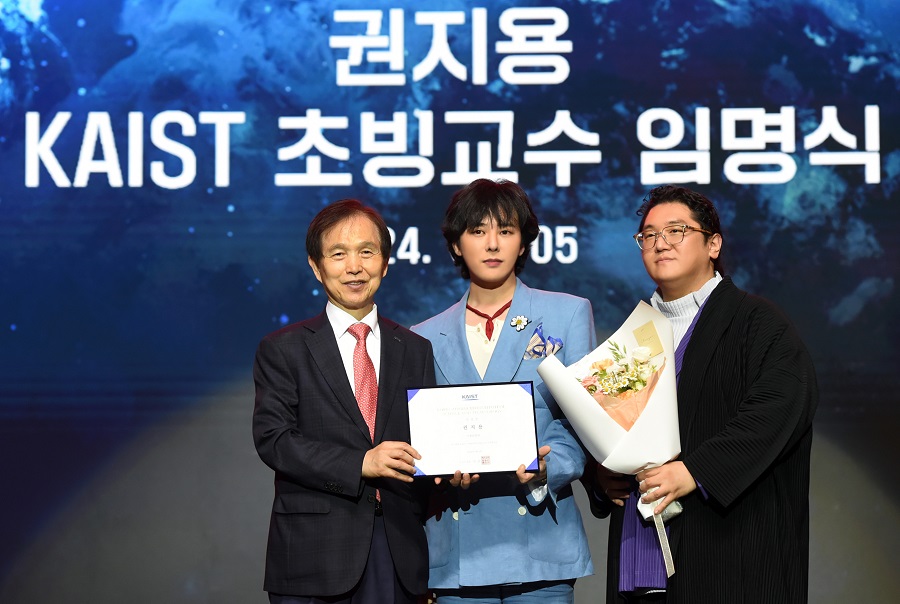 KAIST appoints K-Pop Star “G-Dragon” Kwon Ji-yong as a visiting professor
KAIST (President Kwang Hyung Lee) announced on June 5th that its Department of Mechanical Engineering has appointed Kwon Ji-yong, a K-Pop star better known as G-Dragon, as a visiting professor. The appointment was officiated at the “Innovate Korea 2024” event held at the KAIST Sports Complex in the morning of the 5th.
This appointment was promoted to expand the global competitiveness of Korean culture by applying the latest scientific technology developed from KAIST to K-content and the cultural industry.
An official from Galaxy Corporation, Mr. Kwon’s agency, said, “Through this appointment, we expect to contribute to market innovation and to the global spread and growth of K-culture through research and development of ‘entertech’*.”
* Entertech: A compound word of ‘entertainment’ and ‘technology’ refering to an industry that creates new added value by combining ICT with intellectual property rights (IP) and contents, which are the core values of entertainment.
The newly appointed Visiting Professor Kwon Ji-yong is scheduled to give a special lecture on leadership to undergraduate and graduate students. The purpose is to share his experience and life as a world-class artist to provide KAIST students with vision and insight into the world, as well as the courage and inspiration to pioneer within their own fields of expertise.
In addition, cultural events are planned to be held to help facilitate communication with KAIST members and provide artistic experiences necessary to grow into creative and convergent talents.
Joint research that applies KAIST's various technologies to art and cultural contents will also be pursued. ‘(temporarily named) KAIST-Galaxy Corporation Entertech Research Center’ will be established within the Department of Mechanical Engineering, conducting ▴research on Digital Twin technology for Korean Wave artists, starting with G-Dragon himself ▴convergent research on science and technology encompassing artificial intelligence, robots, and metaverse and K-Culture and ▴research on the development of differentiated avatars of artists using the latest technologies such as volumetrics, motion capture, and haptics.
Galaxy Corporation produces highly talked about televised shows including 'Physical: 100 Season 2', which achieved the feat of ranking first in the Netflix’s ‘Global Top 10 Non-English TV Shows’ category, as well as 'Street Woman Fighter', '2 Days & 1 Night', 'Let's Play Soccer: Mungchyeoya Chanda' and 'Mr. Trot 2', and expanded its IP (intellectual property rights) to all aspects of entertainment, from broadcasting to the music industry by recruiting G-Dragon in December last year.
It is an 'entertech' company that is pioneering a new content market by combining IP with the latest digital technologies such as metaverse, avatar, and artificial intelligence (AI). Based on these achievements, it recently signed a partnership with a global investment bank (IB). Through global investment, the company is soon to be the first entertech startup to become a unicorn (corporate value of 1 trillion won).
Kwon Ji-yong said, “It is an honor to be a visiting professor at KAIST, where countless scientific geniuses come out of. I am hoping the best of science and technology experts and my expertise in the entertainment business will come together and a great synergy, a ‘big bang’ will be ensue as a result.
“More and more musicians are working with artificial intelligence and these cutting-edge technologies enable more diverse forms of creative work,” he continued. He also expressed his specific wish. “Through the AI avatar developed jointly by Galaxy Corporation and KAIST, I wish to communicate more closely with my fans around the world that I cannot meet so often otherwise.”
President Kwang-Hyung Lee said, “Considering that KAIST is a university that has always explored new things and pioneered unknown territories since its establishment, I believe that Kwon Ji-yong also shares KAIST's DNA in that he is a leader and pioneer who has attained world-class achievements in the world of culture and arts.”
President Lee continued expressing his expectations saying, “Kwon Ji-yong will not only contribute to taking KAIST’s science and technology to spread and grow K-culture on the global stage, through his activities but also in sharing his experience and spirit as the trend leader of the world, he will be an asset to the members of KAIST which aims to become a top-tier university.”
The period of Kwon Ji-yong’s professorship is two years from the 4th of this month to June of 2026. In addition, Professor Kwon Ji-yong has been appointed as KAIST’s global ambassador to help strengthen KAIST's international presence.
Professor Kwon Ji-yong, who began his career as G-Dragon, has established himself as an icon symbolizing Korean pop culture over 18 years as a member and the leader of the K-Pop idol group 'Big Bang', which debuted in 2006 and gained global popularity. While being recognized for his outstanding ability in all aspects of his music, from writing lyrics, composing, and producing to performing, he has also been active in fashion, becoming the first Asian man to be selected as a global ambassador for Chanel in 2016, spreading Korean music and fashion to the world.
In June, 2017, he released his 3rd solo album 'Kwon Ji Yong' on USB instead of the existing CD format, for the first time in Korea. He also attended CES, the world's largest home appliance and IT exhibition held in Las Vegas, USA in January of this year, extending his strides as a 'tech-tainer'.
2024.06.05 View 15431
KAIST appoints K-Pop Star “G-Dragon” Kwon Ji-yong as a visiting professor
KAIST (President Kwang Hyung Lee) announced on June 5th that its Department of Mechanical Engineering has appointed Kwon Ji-yong, a K-Pop star better known as G-Dragon, as a visiting professor. The appointment was officiated at the “Innovate Korea 2024” event held at the KAIST Sports Complex in the morning of the 5th.
This appointment was promoted to expand the global competitiveness of Korean culture by applying the latest scientific technology developed from KAIST to K-content and the cultural industry.
An official from Galaxy Corporation, Mr. Kwon’s agency, said, “Through this appointment, we expect to contribute to market innovation and to the global spread and growth of K-culture through research and development of ‘entertech’*.”
* Entertech: A compound word of ‘entertainment’ and ‘technology’ refering to an industry that creates new added value by combining ICT with intellectual property rights (IP) and contents, which are the core values of entertainment.
The newly appointed Visiting Professor Kwon Ji-yong is scheduled to give a special lecture on leadership to undergraduate and graduate students. The purpose is to share his experience and life as a world-class artist to provide KAIST students with vision and insight into the world, as well as the courage and inspiration to pioneer within their own fields of expertise.
In addition, cultural events are planned to be held to help facilitate communication with KAIST members and provide artistic experiences necessary to grow into creative and convergent talents.
Joint research that applies KAIST's various technologies to art and cultural contents will also be pursued. ‘(temporarily named) KAIST-Galaxy Corporation Entertech Research Center’ will be established within the Department of Mechanical Engineering, conducting ▴research on Digital Twin technology for Korean Wave artists, starting with G-Dragon himself ▴convergent research on science and technology encompassing artificial intelligence, robots, and metaverse and K-Culture and ▴research on the development of differentiated avatars of artists using the latest technologies such as volumetrics, motion capture, and haptics.
Galaxy Corporation produces highly talked about televised shows including 'Physical: 100 Season 2', which achieved the feat of ranking first in the Netflix’s ‘Global Top 10 Non-English TV Shows’ category, as well as 'Street Woman Fighter', '2 Days & 1 Night', 'Let's Play Soccer: Mungchyeoya Chanda' and 'Mr. Trot 2', and expanded its IP (intellectual property rights) to all aspects of entertainment, from broadcasting to the music industry by recruiting G-Dragon in December last year.
It is an 'entertech' company that is pioneering a new content market by combining IP with the latest digital technologies such as metaverse, avatar, and artificial intelligence (AI). Based on these achievements, it recently signed a partnership with a global investment bank (IB). Through global investment, the company is soon to be the first entertech startup to become a unicorn (corporate value of 1 trillion won).
Kwon Ji-yong said, “It is an honor to be a visiting professor at KAIST, where countless scientific geniuses come out of. I am hoping the best of science and technology experts and my expertise in the entertainment business will come together and a great synergy, a ‘big bang’ will be ensue as a result.
“More and more musicians are working with artificial intelligence and these cutting-edge technologies enable more diverse forms of creative work,” he continued. He also expressed his specific wish. “Through the AI avatar developed jointly by Galaxy Corporation and KAIST, I wish to communicate more closely with my fans around the world that I cannot meet so often otherwise.”
President Kwang-Hyung Lee said, “Considering that KAIST is a university that has always explored new things and pioneered unknown territories since its establishment, I believe that Kwon Ji-yong also shares KAIST's DNA in that he is a leader and pioneer who has attained world-class achievements in the world of culture and arts.”
President Lee continued expressing his expectations saying, “Kwon Ji-yong will not only contribute to taking KAIST’s science and technology to spread and grow K-culture on the global stage, through his activities but also in sharing his experience and spirit as the trend leader of the world, he will be an asset to the members of KAIST which aims to become a top-tier university.”
The period of Kwon Ji-yong’s professorship is two years from the 4th of this month to June of 2026. In addition, Professor Kwon Ji-yong has been appointed as KAIST’s global ambassador to help strengthen KAIST's international presence.
Professor Kwon Ji-yong, who began his career as G-Dragon, has established himself as an icon symbolizing Korean pop culture over 18 years as a member and the leader of the K-Pop idol group 'Big Bang', which debuted in 2006 and gained global popularity. While being recognized for his outstanding ability in all aspects of his music, from writing lyrics, composing, and producing to performing, he has also been active in fashion, becoming the first Asian man to be selected as a global ambassador for Chanel in 2016, spreading Korean music and fashion to the world.
In June, 2017, he released his 3rd solo album 'Kwon Ji Yong' on USB instead of the existing CD format, for the first time in Korea. He also attended CES, the world's largest home appliance and IT exhibition held in Las Vegas, USA in January of this year, extending his strides as a 'tech-tainer'.
2024.06.05 View 15431 -
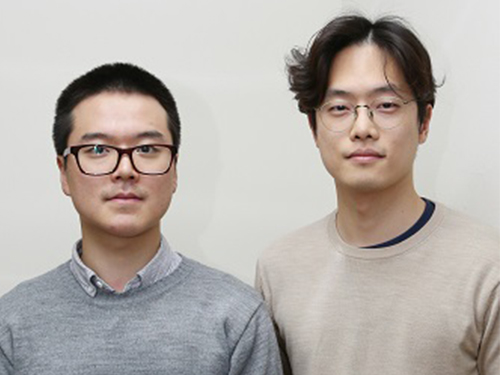 KAIST Students Invited to the BNL
Siheon Ryee and Taek Jung Kim, combined Masters and PhD students from the Department of Physics, have been invited to be visiting researchers at the Brookhaven National Laboratory (BNL).
The BNL, located in Long Island, New York, is one of the most esteemed institutes in the United States. Ryee and Kim received the invitation from the Center for Computational Design of Functional Strongly Correlated Materials and Theoretical Spectroscopy. This center was established by scholars who have been leading this field in the United States.
The two students will be participating in developing a methodology and code for calculating strongly correlated electronic materials, and a grant of 40,000 USD will be provided to each student. This amount of support is not often awarded to researchers outside of postdoctoral programs.
Moreover, they are guaranteed to continue their combined Masters and PhD program and write their dissertations under the supervision of their advisor, Professor Myung Joon Han from the Department of Physics.
Professor Han said, “I was impressed by how well-known scholars established the center in order to cooperate with each other to solve challenging problems. Also, I was surprised and happy that my students were invited to this outstanding institute.”
“I believe that doing research with leaders in their field will give valuable experience to the students. At the same time, my students will be a great help to the scholars of the institute,” he added.
2018.01.11 View 8014
KAIST Students Invited to the BNL
Siheon Ryee and Taek Jung Kim, combined Masters and PhD students from the Department of Physics, have been invited to be visiting researchers at the Brookhaven National Laboratory (BNL).
The BNL, located in Long Island, New York, is one of the most esteemed institutes in the United States. Ryee and Kim received the invitation from the Center for Computational Design of Functional Strongly Correlated Materials and Theoretical Spectroscopy. This center was established by scholars who have been leading this field in the United States.
The two students will be participating in developing a methodology and code for calculating strongly correlated electronic materials, and a grant of 40,000 USD will be provided to each student. This amount of support is not often awarded to researchers outside of postdoctoral programs.
Moreover, they are guaranteed to continue their combined Masters and PhD program and write their dissertations under the supervision of their advisor, Professor Myung Joon Han from the Department of Physics.
Professor Han said, “I was impressed by how well-known scholars established the center in order to cooperate with each other to solve challenging problems. Also, I was surprised and happy that my students were invited to this outstanding institute.”
“I believe that doing research with leaders in their field will give valuable experience to the students. At the same time, my students will be a great help to the scholars of the institute,” he added.
2018.01.11 View 8014 -
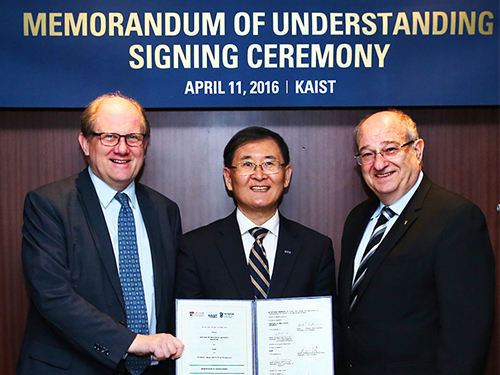 KAIST, NTU, and Technion Collaborate for Research in Emerging Fields
KAIST, Nanyang Technological University (NTU) of Singapore, and Technion of Israel signed an agreement on April 11, 2016 in Seoul to create a five-year joint research program for some of the most innovative and entrepreneurial areas: robotics, medical technologies, satellites, materials science and engineering, and entrepreneurship. Under the agreement, the universities will also offer dual degree opportunities, exchange visits, and internships.
In the picture from the left, Bertil Andersson of NTU, Sung-Mo Kang of KAIST, and Peretz Lavie of Technion hold the signed memorandum of understanding.
2016.04.14 View 11603
KAIST, NTU, and Technion Collaborate for Research in Emerging Fields
KAIST, Nanyang Technological University (NTU) of Singapore, and Technion of Israel signed an agreement on April 11, 2016 in Seoul to create a five-year joint research program for some of the most innovative and entrepreneurial areas: robotics, medical technologies, satellites, materials science and engineering, and entrepreneurship. Under the agreement, the universities will also offer dual degree opportunities, exchange visits, and internships.
In the picture from the left, Bertil Andersson of NTU, Sung-Mo Kang of KAIST, and Peretz Lavie of Technion hold the signed memorandum of understanding.
2016.04.14 View 11603 -
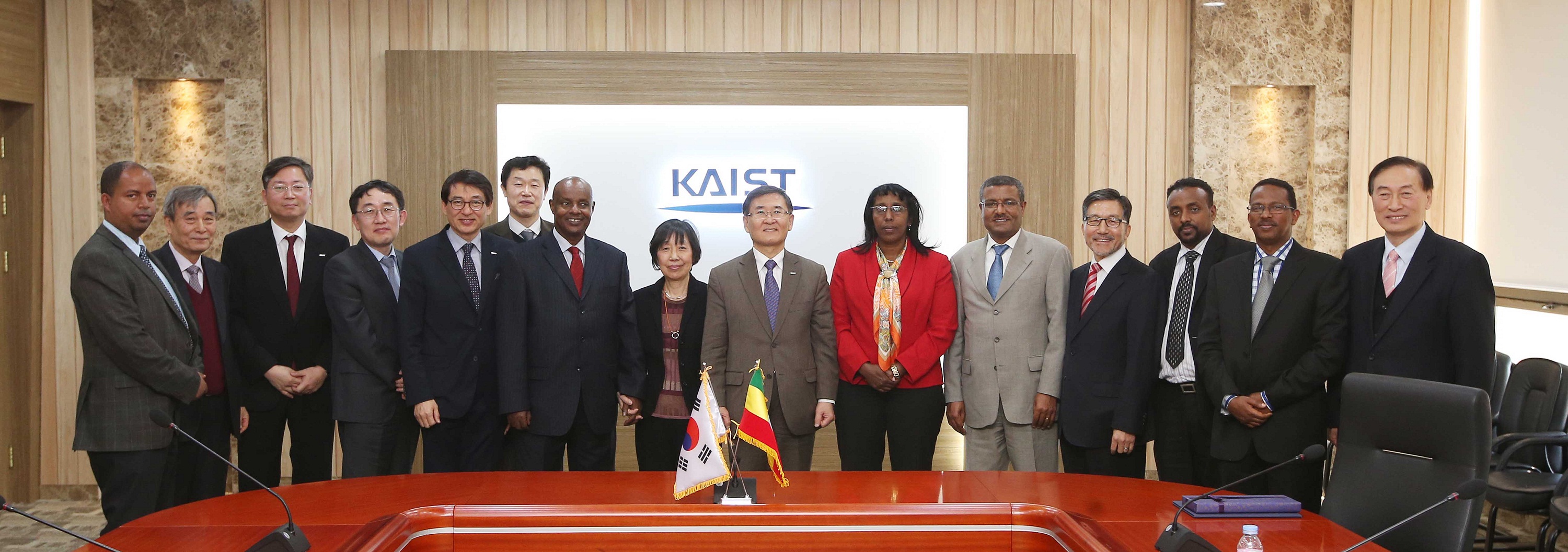 Ethiopian Minister of Education Visits KAIST
An Ethiopian delegation headed by the Minister of Education visited the KAIST campus on February 26, 2015. The delegation consisted of Mr. Demitu Hambisa, Minister of Education, Mr. Dibaba Abdetta, Ethiopian Ambassador to Korea, Dr. Jang-Kyu Lee, President of Adama Science and Technology University (ASTU), and Mr. Nurelegne Tefera, President of Addis Ababa Science and Technology University (AASTU).
Minister Hambisa explained the purpose of his visit, “We would like to learn about what KAIST has achieved over the years for Korea and its people and increase exchanges and cooperation between our universities and KAIST.”
KAIST and the two Ethiopian universities, ASTU and AASTU, signed memoranda of understanding for cooperative programs in science and engineering education.
Established in 1993, ASTU appointed Dr. Jang-Kyu Lee, a former professor from Seoul National University, Korea, to become its president since 2011. President Lee is the first Korean ever to have served the institution.
2015.02.26 View 8100
Ethiopian Minister of Education Visits KAIST
An Ethiopian delegation headed by the Minister of Education visited the KAIST campus on February 26, 2015. The delegation consisted of Mr. Demitu Hambisa, Minister of Education, Mr. Dibaba Abdetta, Ethiopian Ambassador to Korea, Dr. Jang-Kyu Lee, President of Adama Science and Technology University (ASTU), and Mr. Nurelegne Tefera, President of Addis Ababa Science and Technology University (AASTU).
Minister Hambisa explained the purpose of his visit, “We would like to learn about what KAIST has achieved over the years for Korea and its people and increase exchanges and cooperation between our universities and KAIST.”
KAIST and the two Ethiopian universities, ASTU and AASTU, signed memoranda of understanding for cooperative programs in science and engineering education.
Established in 1993, ASTU appointed Dr. Jang-Kyu Lee, a former professor from Seoul National University, Korea, to become its president since 2011. President Lee is the first Korean ever to have served the institution.
2015.02.26 View 8100 -
 March 8th, Dr. Ryu Geun Chul Passes Away
Korea’s renowned, leading donator Dr. Ryu Geun Chul (KAIST Invited Visiting Professor) passed away on the 8th of March (Tues) in 3:24pm. The late Dr. Chul was diagnosed with cerebral infarction in January and has been braving the illness and even went through an operation. However despite these efforts, his condition worsened and passed away. He leaves behind his wife, two sons, and three daughters.
The sending away ceremony was held on the 10th of March 6:50am.
An article detailing his achievements and contributions will be posted shortly.
2011.03.18 View 9116
March 8th, Dr. Ryu Geun Chul Passes Away
Korea’s renowned, leading donator Dr. Ryu Geun Chul (KAIST Invited Visiting Professor) passed away on the 8th of March (Tues) in 3:24pm. The late Dr. Chul was diagnosed with cerebral infarction in January and has been braving the illness and even went through an operation. However despite these efforts, his condition worsened and passed away. He leaves behind his wife, two sons, and three daughters.
The sending away ceremony was held on the 10th of March 6:50am.
An article detailing his achievements and contributions will be posted shortly.
2011.03.18 View 9116 -
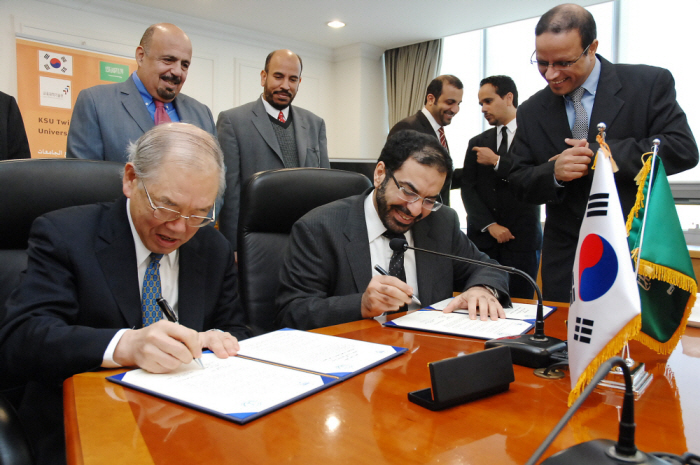 Minister of Higher Education of Saudi Arabia Visited KAIST to Sign Agreement on Joint Research Projects
Khaled bin Mohammad Al-Anqari, the Minister of Higher Education of Saudi Arabia, visited KAIST on October 26th to conclude a joint agreement with KAIST.
The group of Saudi Arabian visitors included Abdullah bin Abdularhman Al-Othman, President of the King Saud University, Osama bin Sadiq Tayeb, President of King Abdulaziz University, and Khalid bin Salih Al-Sultan, President of the best Saudi Arabian technological university, King Fahad University of Petroleum and Minerals.
Through research agreement between KAIST and the King Saud University and King Fahad University of Petroleum and Minerals, joint research projects, mutual visitations of research professors, interchange of academic programs, joint seminars and scientific societies will be held to promote the lively interchange between higher education institutions of Korea and Saudi Arabia.
In particular, King Saud University and KAIST has signed an agreement on joint research projects in the fields of “Solar-Ocean Thermal Exchange Desalination,” “Develop New Energy Management Service for Residential and Commercial Customers Using Smart Metering and Sensor Network Information” and “Superior Production of Lactic Acid from Saudi Dates Using Bioprocess Technology.”
The projects will be funded by the Saudi Arabian government, and their scope will be determined in the future
“Compared to the robust industrial economic interactions between the Middle East and Korea, the interchange of the two countries’ higher education institutions has been poor,” said Jong Hyun Kim, Visiting Professor of Nuclear & Quantum Engineering Department of KAIST who will be conducting one of the joint programs with the Electrical Engineering Department of the King Saud University. “Like this joint research, I hope KAIST will, in many different ways, lead the way in cooperating and interacting with higher education institutions of the Middle EAST.”
Al-Anquari, Minister of Higher Education of Saudi Arabia, who showed great interest in KAIST’s innovative research and high technology development, expressed his will to put more effort into extending the interchange between universities of Saudi Arabia and of Korea, including KAIST.
2010.11.03 View 16123
Minister of Higher Education of Saudi Arabia Visited KAIST to Sign Agreement on Joint Research Projects
Khaled bin Mohammad Al-Anqari, the Minister of Higher Education of Saudi Arabia, visited KAIST on October 26th to conclude a joint agreement with KAIST.
The group of Saudi Arabian visitors included Abdullah bin Abdularhman Al-Othman, President of the King Saud University, Osama bin Sadiq Tayeb, President of King Abdulaziz University, and Khalid bin Salih Al-Sultan, President of the best Saudi Arabian technological university, King Fahad University of Petroleum and Minerals.
Through research agreement between KAIST and the King Saud University and King Fahad University of Petroleum and Minerals, joint research projects, mutual visitations of research professors, interchange of academic programs, joint seminars and scientific societies will be held to promote the lively interchange between higher education institutions of Korea and Saudi Arabia.
In particular, King Saud University and KAIST has signed an agreement on joint research projects in the fields of “Solar-Ocean Thermal Exchange Desalination,” “Develop New Energy Management Service for Residential and Commercial Customers Using Smart Metering and Sensor Network Information” and “Superior Production of Lactic Acid from Saudi Dates Using Bioprocess Technology.”
The projects will be funded by the Saudi Arabian government, and their scope will be determined in the future
“Compared to the robust industrial economic interactions between the Middle East and Korea, the interchange of the two countries’ higher education institutions has been poor,” said Jong Hyun Kim, Visiting Professor of Nuclear & Quantum Engineering Department of KAIST who will be conducting one of the joint programs with the Electrical Engineering Department of the King Saud University. “Like this joint research, I hope KAIST will, in many different ways, lead the way in cooperating and interacting with higher education institutions of the Middle EAST.”
Al-Anquari, Minister of Higher Education of Saudi Arabia, who showed great interest in KAIST’s innovative research and high technology development, expressed his will to put more effort into extending the interchange between universities of Saudi Arabia and of Korea, including KAIST.
2010.11.03 View 16123 -
 Reasons for Hope: Jane Goodall Lectured at KAIST
Dr. Jane Goodall, globally acknowledged chimpanzee researcher and environmental activist, was invited to KAIST and gave a lecture on the importance of preservation and restoration of the ecosystem on the earth. The lecture took place on the 28 of September at the university’s auditorium from 5PM to 7PM.
The lecture, titled “Reasons for Hope: Celebrating 50 Years of Chimpanzee Research,” was organized to celebrate her longtime career as a primatologist and anthropologist.
The visiting of Dr. Jane Goodall, who had dedicated a long period of time in spreading the significance of the diversity of life, gave a meaningful opportunity to increase the Korean public’s awareness of life’s diversity.
This lecture was jointly sponsored by Ehwa Woman’s University and KAIST, and the lecture was translated by Professor Choi Jae-Chun of Ehwa University.
2010.09.29 View 9798
Reasons for Hope: Jane Goodall Lectured at KAIST
Dr. Jane Goodall, globally acknowledged chimpanzee researcher and environmental activist, was invited to KAIST and gave a lecture on the importance of preservation and restoration of the ecosystem on the earth. The lecture took place on the 28 of September at the university’s auditorium from 5PM to 7PM.
The lecture, titled “Reasons for Hope: Celebrating 50 Years of Chimpanzee Research,” was organized to celebrate her longtime career as a primatologist and anthropologist.
The visiting of Dr. Jane Goodall, who had dedicated a long period of time in spreading the significance of the diversity of life, gave a meaningful opportunity to increase the Korean public’s awareness of life’s diversity.
This lecture was jointly sponsored by Ehwa Woman’s University and KAIST, and the lecture was translated by Professor Choi Jae-Chun of Ehwa University.
2010.09.29 View 9798 -
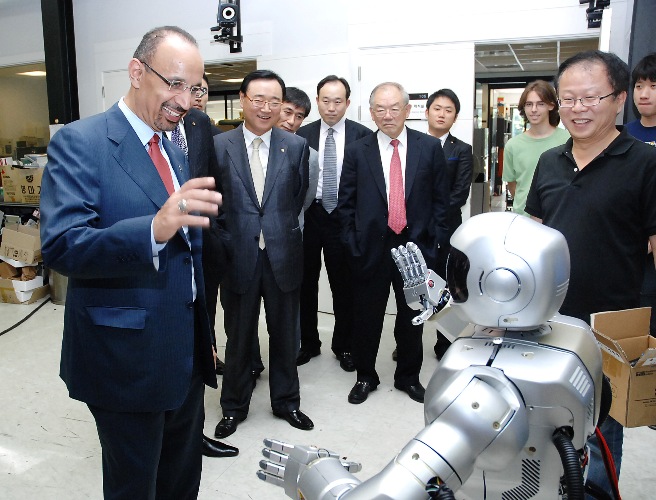 The CEO of the World's Largest Oil Company Visited KAIST.
Khalid A. Al-Falih, the Chief Executive Officer (CEO) of Saudi Aramco, an oil company owned by Saudi Arabia, the largest oil-producing country in the world, visited the KAIST campus on September 15, 2010. During his visit, Mr. Al-Falih was introduced to KAIST’s innovative projects such as On-Line Electric Vehicle, Mobile Harbor, and Hubo.
Mr. Al-Falih was invited to the KAIST campus by President Suh, both of which are currently consultants for King Fahd University of Petroleum and Minerals (KFUPM) in Saudi Arabia. Having visited Daejon right after attending the 21st World Energy Congress in Montreal, Canada, he would head to China for another conference on the next day.
Al-Falih stated that he visited KAIST despite his busy schedule because he had “heard about KAIST that it is one of the best research oriented universities in Korea. Aramco and KAIST share the same goal of putting an effort in solving the problems that are of great concern to mankind today including issues related to energy, food, water, and climate.”
“There are researchers in our company who know Korean, and we wish to send them to KAIST’s masters and doctorate programs to train them into professional research force. In particular, Aramco is hoping to strengthen research cooperation between KFUPM, King Abdullah University of Science Technology (KAUST), and KAIST as well as contribute to the economic development between Saudi Arabia and Korea by increasing cooperation with KAIST through our shared visions.”
Saudi Aramco is the largest oil company in the world with the largest proven crude oil reserves and production known to date, responsible for over 30% of total OPEC crude oil production. It produces over 3.4 billion barrels of oil annually and has invested in S-Oil, one of the top three oil refining companies in Korea in 1991 to contribute to the development of Korean national oil refining industry.
2010.09.17 View 12348
The CEO of the World's Largest Oil Company Visited KAIST.
Khalid A. Al-Falih, the Chief Executive Officer (CEO) of Saudi Aramco, an oil company owned by Saudi Arabia, the largest oil-producing country in the world, visited the KAIST campus on September 15, 2010. During his visit, Mr. Al-Falih was introduced to KAIST’s innovative projects such as On-Line Electric Vehicle, Mobile Harbor, and Hubo.
Mr. Al-Falih was invited to the KAIST campus by President Suh, both of which are currently consultants for King Fahd University of Petroleum and Minerals (KFUPM) in Saudi Arabia. Having visited Daejon right after attending the 21st World Energy Congress in Montreal, Canada, he would head to China for another conference on the next day.
Al-Falih stated that he visited KAIST despite his busy schedule because he had “heard about KAIST that it is one of the best research oriented universities in Korea. Aramco and KAIST share the same goal of putting an effort in solving the problems that are of great concern to mankind today including issues related to energy, food, water, and climate.”
“There are researchers in our company who know Korean, and we wish to send them to KAIST’s masters and doctorate programs to train them into professional research force. In particular, Aramco is hoping to strengthen research cooperation between KFUPM, King Abdullah University of Science Technology (KAUST), and KAIST as well as contribute to the economic development between Saudi Arabia and Korea by increasing cooperation with KAIST through our shared visions.”
Saudi Aramco is the largest oil company in the world with the largest proven crude oil reserves and production known to date, responsible for over 30% of total OPEC crude oil production. It produces over 3.4 billion barrels of oil annually and has invested in S-Oil, one of the top three oil refining companies in Korea in 1991 to contribute to the development of Korean national oil refining industry.
2010.09.17 View 12348 -
 President of Israel visited KAIST on June 9, 2010.
President of Israel, Shimon Peres, visited KAIST today on June 9, 2010 to witness the development of science and technology in Korea and explore ways of establishing collaboration and cooperation with industries and universities between Korea and Israel. President Peres led a delegation consisted of the Israeli Mister of Industry, Trade, and Labor, the Minister of Communication, and 60 business leaders from the top companies in the security, infrastructure, communication, high-tech, and water industries.
Upon their arrival to the campus, the Israeli delegation was greeted by KAIST’s humanoid robot, “HUBO,” and then moved to its branch campus, IT Convergence Campus, for a ride of Online Electric Vehicle (OLEV) that has been developed by KAIST. The OLEV receives the necessary power through the cable lines buried underground, so it can be provided with a constant and continuous supply of electricity while running or stopping.
Between roads and OLEVs is nothing but space. There is no electrical wires intricately crossed underbody of the electric car or above the road. The pick-up equipment installed beneath the body of the electric car collects magnetic fields created around the underground cables, which then converts the filed into electricity. The OLEV’s wireless, non-contact charging system made it possible for a battery currently used for hybrid or pure electric cars on the market to be smaller and cheaper.
President Peres expressed a great interest in the technology applied to the OLVE, quoting, “the OLEV system is indeed very impressive.” He talked about efforts being made in Israel with respect to the development of electric cars. The country plans to replace the conventional transportation system with electric cars by constructing a network of battery exchange stations and roadside charge points which allow the cars to be charged whenever they are parked.
“Despite the different approach taken by the two nations for the development of electric cars, I believe that transforming the automobile industry from combustion engine to electric system is the right direction we should all follow. Without addressing the current transportation system that heavily dependent on natural resources, we will not be able to promote “green growth on a global scale,” added President Peres.
In addition to electric cars, President Peres took up a considerable portion of his time to exchange ideas on how to expand cooperative relations between universities in Korea and Israel, specifically in the area of space, biotechnology, nanotechnology, high-tech, renewable and alternative energy, and the EEWS initiatives that have been implemented by KAIST to find answers to global issues such as climate change and depletion of natural resources. The EEWS stands for energy, environment, water, and sustainability.
In response, the president of KAIST pledged to set up a stronger and greater tie with research universities in Israel, particularly called for more collaboration between KAIST and Technion-Israel Institute of Technology.
Also, the Israeli delegation had a tour for several Korean research and development centers in Daedeok Innopolis, located in the City of Daejeon, which is the 2nd largest science and research complex in Korea.
Shimon Peres, the 9th president of Israel, held many of important government positions in Israel, among other things, Prime Minster and Minister of Defense. He won Nobel Peace Prize in 1994, together with Yitzhak Rabin and Yasser Arafat for the conclusion of a peace agreement, Oslo Accords, between Israel and Palestine Liberation Organization.
2010.06.09 View 17249
President of Israel visited KAIST on June 9, 2010.
President of Israel, Shimon Peres, visited KAIST today on June 9, 2010 to witness the development of science and technology in Korea and explore ways of establishing collaboration and cooperation with industries and universities between Korea and Israel. President Peres led a delegation consisted of the Israeli Mister of Industry, Trade, and Labor, the Minister of Communication, and 60 business leaders from the top companies in the security, infrastructure, communication, high-tech, and water industries.
Upon their arrival to the campus, the Israeli delegation was greeted by KAIST’s humanoid robot, “HUBO,” and then moved to its branch campus, IT Convergence Campus, for a ride of Online Electric Vehicle (OLEV) that has been developed by KAIST. The OLEV receives the necessary power through the cable lines buried underground, so it can be provided with a constant and continuous supply of electricity while running or stopping.
Between roads and OLEVs is nothing but space. There is no electrical wires intricately crossed underbody of the electric car or above the road. The pick-up equipment installed beneath the body of the electric car collects magnetic fields created around the underground cables, which then converts the filed into electricity. The OLEV’s wireless, non-contact charging system made it possible for a battery currently used for hybrid or pure electric cars on the market to be smaller and cheaper.
President Peres expressed a great interest in the technology applied to the OLVE, quoting, “the OLEV system is indeed very impressive.” He talked about efforts being made in Israel with respect to the development of electric cars. The country plans to replace the conventional transportation system with electric cars by constructing a network of battery exchange stations and roadside charge points which allow the cars to be charged whenever they are parked.
“Despite the different approach taken by the two nations for the development of electric cars, I believe that transforming the automobile industry from combustion engine to electric system is the right direction we should all follow. Without addressing the current transportation system that heavily dependent on natural resources, we will not be able to promote “green growth on a global scale,” added President Peres.
In addition to electric cars, President Peres took up a considerable portion of his time to exchange ideas on how to expand cooperative relations between universities in Korea and Israel, specifically in the area of space, biotechnology, nanotechnology, high-tech, renewable and alternative energy, and the EEWS initiatives that have been implemented by KAIST to find answers to global issues such as climate change and depletion of natural resources. The EEWS stands for energy, environment, water, and sustainability.
In response, the president of KAIST pledged to set up a stronger and greater tie with research universities in Israel, particularly called for more collaboration between KAIST and Technion-Israel Institute of Technology.
Also, the Israeli delegation had a tour for several Korean research and development centers in Daedeok Innopolis, located in the City of Daejeon, which is the 2nd largest science and research complex in Korea.
Shimon Peres, the 9th president of Israel, held many of important government positions in Israel, among other things, Prime Minster and Minister of Defense. He won Nobel Peace Prize in 1994, together with Yitzhak Rabin and Yasser Arafat for the conclusion of a peace agreement, Oslo Accords, between Israel and Palestine Liberation Organization.
2010.06.09 View 17249 -
 Prime Minister Lars Løkke Rasmussen of the Kingdom of Denmark visited KAIST on March 11, 2010.
Prime Minister Lars Løkke Rasmussen of the Kingdom of Denmark visited KAIST on March 11, 2010. HUBO, a humanoid robotdeveloped by KAIST, gave a warm welcome to the prime minister and his delegation.
Prime Minister Lars Løkke Rasmussen of Denmark visited Moon-Ji Campus of KAIST on March 11, 2010 and had a chance to meet a humanoid robot, HUBO. Since the first appearance in 2005, HUBO has been continuously developed by KAIST for further refinements.
HUBO welcomed the prime minister and offered him a flower bouquet. They also shook hands and exchanged small talks in Danish, which made the delegation pleasantly surprised.
The Danish delegation had a ride on Online Electric Vehicle (OLEV) and showed a great interest in the technology applied therein.
The prime minister said, “Denmark has a keen interest in green technology, and I was very impressed by OLEV. It is just amazing to see how fast KAIST has developed as an outstanding research university in the world during a short period of time.”
President Lee Myung-bak invited the Danish prime minister to discuss current international developments, including issues involving the Korean Peninsula, and ways to enhance bilateral cooperation in such areas as trade, investment, renewable energy and green growth.
2010.03.17 View 13467
Prime Minister Lars Løkke Rasmussen of the Kingdom of Denmark visited KAIST on March 11, 2010.
Prime Minister Lars Løkke Rasmussen of the Kingdom of Denmark visited KAIST on March 11, 2010. HUBO, a humanoid robotdeveloped by KAIST, gave a warm welcome to the prime minister and his delegation.
Prime Minister Lars Løkke Rasmussen of Denmark visited Moon-Ji Campus of KAIST on March 11, 2010 and had a chance to meet a humanoid robot, HUBO. Since the first appearance in 2005, HUBO has been continuously developed by KAIST for further refinements.
HUBO welcomed the prime minister and offered him a flower bouquet. They also shook hands and exchanged small talks in Danish, which made the delegation pleasantly surprised.
The Danish delegation had a ride on Online Electric Vehicle (OLEV) and showed a great interest in the technology applied therein.
The prime minister said, “Denmark has a keen interest in green technology, and I was very impressed by OLEV. It is just amazing to see how fast KAIST has developed as an outstanding research university in the world during a short period of time.”
President Lee Myung-bak invited the Danish prime minister to discuss current international developments, including issues involving the Korean Peninsula, and ways to enhance bilateral cooperation in such areas as trade, investment, renewable energy and green growth.
2010.03.17 View 13467 -
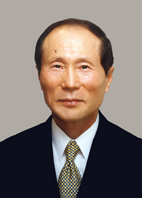 Board Chairman Chung Makes First Visit to Building Named After Him
Moon-Soul Chung, chairman of the KAIST board of trustees, visited the building built with his donation on Monday (Oct. 19) for the first time since he made the deed of gift eight years ago, university authorities said on Monday (Oct. 19).
In 2000, Chung, founder and former CEO of Mirae Corp, manufacturer of semiconductor testing equipment, announced retirement and handed over the presidency of his company to one of his managing directors. One year later in 2001, he donated 30 billion won, then equivalent to $30 million, to KAIST. It was by then the largest amount given by a single donor.
The major part of his donation went to constructing a building for the newly-established Department of Bio and Brain Engineering, and it was named after him. However, Chung did not attend the ground-breaking and dedication ceremonies, saying that he would not enter the building until KAIST achieved a breakthrough technology which can inject a hope to Koreans.
On his first visit to the building, he was briefed on the major research outcomes of the department over the past seven years, which were highlighted by the recent invention of an apparatus for measuring perfusion rate of legs. A KAIST team headed by Prof. Chul-Hee Choi invented a light leakage prevention unit including a light emitting device for radiating light having a certain wavelength onto a living body injected with Indocyanine Green (ICG).
According to Prof. Choi, the invention relates to an apparatus for measuring the perfusion rate of legs. The invention also includes a light leakage prevention housing formed to prevent transmission of external light.
Chung expressing satisfaction with the achievements and encouraged professors, researchers and students working at the Moon-Soul Chung Building.
2009.10.20 View 14432
Board Chairman Chung Makes First Visit to Building Named After Him
Moon-Soul Chung, chairman of the KAIST board of trustees, visited the building built with his donation on Monday (Oct. 19) for the first time since he made the deed of gift eight years ago, university authorities said on Monday (Oct. 19).
In 2000, Chung, founder and former CEO of Mirae Corp, manufacturer of semiconductor testing equipment, announced retirement and handed over the presidency of his company to one of his managing directors. One year later in 2001, he donated 30 billion won, then equivalent to $30 million, to KAIST. It was by then the largest amount given by a single donor.
The major part of his donation went to constructing a building for the newly-established Department of Bio and Brain Engineering, and it was named after him. However, Chung did not attend the ground-breaking and dedication ceremonies, saying that he would not enter the building until KAIST achieved a breakthrough technology which can inject a hope to Koreans.
On his first visit to the building, he was briefed on the major research outcomes of the department over the past seven years, which were highlighted by the recent invention of an apparatus for measuring perfusion rate of legs. A KAIST team headed by Prof. Chul-Hee Choi invented a light leakage prevention unit including a light emitting device for radiating light having a certain wavelength onto a living body injected with Indocyanine Green (ICG).
According to Prof. Choi, the invention relates to an apparatus for measuring the perfusion rate of legs. The invention also includes a light leakage prevention housing formed to prevent transmission of external light.
Chung expressing satisfaction with the achievements and encouraged professors, researchers and students working at the Moon-Soul Chung Building.
2009.10.20 View 14432 -
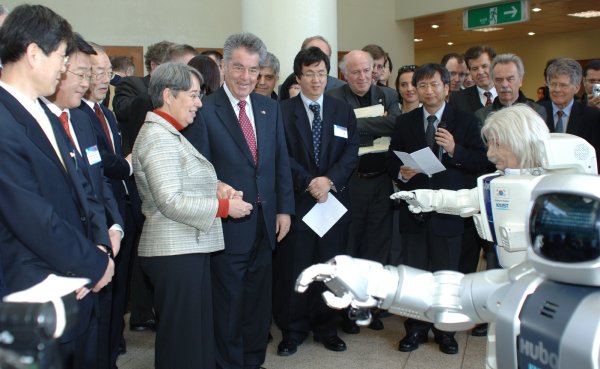 Austrian president and first lady visit KAIST
Austrian President Heinz Fischer and first lady Margit Fischer visited KAIST on April 4.
HUBO and Albert HUBO, humanoid robots of KAIST, welcomed Mr. and Mrs. President from Austria by giving bouquets to and shaking hands with them. HUBO also showed self-introduction, facial expression, and Tae-Geuk-Kwon demonstration.
KAIST President Nam-Pyo Suh said at his welcoming remarks, “KAIST has talented young people as its students, and over 32,000 KAIST graduates are playing very important roles at large conglomerates and schools. To become a world-class university, KAIST is promoting active global exchange programs and hopes to have joint programs with Austrian universities such as the Technical University of Vienna, etc.”
Austrian President Heinz Fischer said at his reply, “I am deeply impressed with KAIST, the final place visited during my trip to Korea. Albert HUBO evidently gave me a tip concerning the high technical power of KAIST. Austria is now on a strong education innovation program, and I hope to establish a long-term cooperation programs with distinguished Korean universities like KAIST.”
After the ceremony, Mr. and Mrs. President from Austria, Mr. and Mrs. President of KAIST, and distinguished guests had a 30-minute long luncheon at the grand seminar room.
2007.04.12 View 13059
Austrian president and first lady visit KAIST
Austrian President Heinz Fischer and first lady Margit Fischer visited KAIST on April 4.
HUBO and Albert HUBO, humanoid robots of KAIST, welcomed Mr. and Mrs. President from Austria by giving bouquets to and shaking hands with them. HUBO also showed self-introduction, facial expression, and Tae-Geuk-Kwon demonstration.
KAIST President Nam-Pyo Suh said at his welcoming remarks, “KAIST has talented young people as its students, and over 32,000 KAIST graduates are playing very important roles at large conglomerates and schools. To become a world-class university, KAIST is promoting active global exchange programs and hopes to have joint programs with Austrian universities such as the Technical University of Vienna, etc.”
Austrian President Heinz Fischer said at his reply, “I am deeply impressed with KAIST, the final place visited during my trip to Korea. Albert HUBO evidently gave me a tip concerning the high technical power of KAIST. Austria is now on a strong education innovation program, and I hope to establish a long-term cooperation programs with distinguished Korean universities like KAIST.”
After the ceremony, Mr. and Mrs. President from Austria, Mr. and Mrs. President of KAIST, and distinguished guests had a 30-minute long luncheon at the grand seminar room.
2007.04.12 View 13059